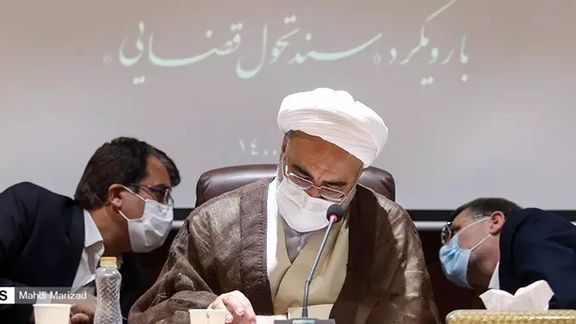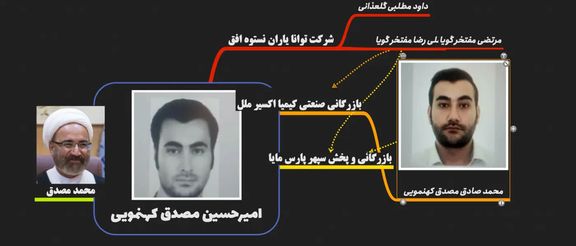Iran Judiciary Deputy Resigns Over Sons’ Massive Corruption Case

A top judiciary official in Iran has resigned several months after a Telegram channel revealed that his two sons were arrested for massive corruption and money laundering.

A top judiciary official in Iran has resigned several months after a Telegram channel revealed that his two sons were arrested for massive corruption and money laundering.
Confirming the resignation, the official news agency of the Iranian judiciary, Mizan, reported on Wednesday that Chief Justice Gholam-Hossein Mohseni Ejei accepted the resignation of First Deputy Mohammad Mosaddegh.
Mizan claimed that Mosaddegh resigned to eliminate any suspicion of influencing the judicial process and to prevent potential abuse of the issue by opponents and detractors. In his resignation, he affirmed that he had not engaged in any communication with other judiciary officials overseeing the case.
Iran ranks 149 out of 180 countries in the 2023 Corruption Perceptions Index (CPI) by Transparency International, scoring 24 out of 100, indicating a very clean state.
A Telegram channel, allegedly linked to security bodies, disclosed in late August that the judiciary deputy’s sons, Mohammad-Sadegh and Amir-Hossein Mosaddegh, were arrested for leveraging their connections to influence significant corruption cases. However, the channel, Oyun, was deactivated or blocked shortly after.
On September 26, judiciary spokesman Masoud Setayeshi confirmed during a briefing that the children of a high-ranking judiciary official had indeed been apprehended for corruption and abuse of influence.

Prosecutors allege that Mosaddegh’s sons laundered substantial sums of money, received through illicit means, to manipulate justice in other cases. These funds were purportedly invested in construction, gold, foreign currency, and luxury cars.
Apart from Mosaddegh’s sons, the case involves twenty-one other individuals. Despite three hearings held thus far, the judiciary has provided limited information to the public, and the prosecution’s sought sentences remain undisclosed.
Pundits say Iran’s biggest cases of corruption, such as businessman Babak Zanjani’s embezzlement of $6 billion of the proceeds from clandestine oil sales in international markets to avoid sanctions, have taken place since 2005 when the populist Mahmoud Ahmadinejad was first elected to presidency.
Former lawmaker Heshmatollah Falahatpisheh estimates that in the past two decades at least $57 billion has been embezzled by government officials and their associates.
In December, revelations regarding the Debsh Tea corruption case, involving nearly $3.5 billion, sent shockwaves across the nation. This case implicates key figures from both current and previous presidential administrations, including ministers of agriculture and industry, as well as the governors of the Central Bank of Iran and the chiefs of Iranian customs administration.
The case involves key figures from both the current and previous presidential administrations, including ministers of agriculture, industry as well as the governors of the Central Bank of Iran and the chiefs of Iranian customs administration.
The company which handled most of the country’s tea imports, sold $1.4 billion of the more than $3.3 billion cheap foreign currency allocated by the government at much higher rates in the black market between 2019 and 2022. This substantial amount of foreign currency was claimed to have been spent on importing tea and tea factory machinery.
Some reports said that until 2020 the annual budget allocated for importing tea was around $300 million, but the budget was suddenly tripled in 2021 without any justification.
The former head of the Iranian parliament's National Security and Foreign Relations Committee Heshmatollah Falahatpisheh has described the case as "One of the biggest embezzlement cases in Iran.
Since 1992, there have been at least eleven major corruption cases involving government and state officials - including in petrochemical, steel, insurance, and oil industries, and a major bank. Iranian media say the total value only in these cases amounts to over $90 billion.
Supreme Leader Ali Khamenei and other officials are always vehement that corruption in Iran is not systematic.